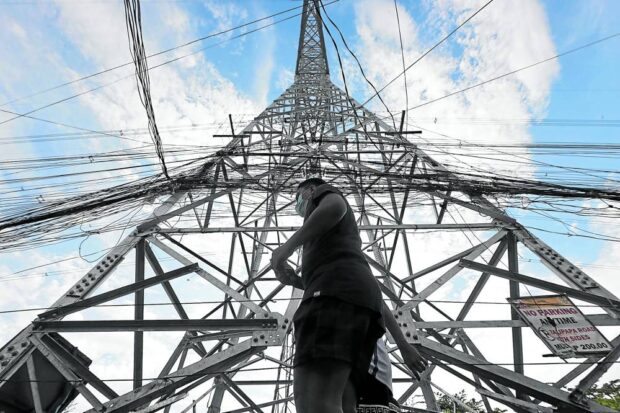
TRANSMISSION TOWER | A pedestrian walks past a transmission tower of the National Grid Corp. of the Philippines (NGCP). The NGCP warns of power interruptions during summer without the needed ancillary services. (INQUIRER FILE PHOTO)
MANILA, Philippines — The National Grid Corp. of the Philippines (NGCP) has warned of intermittent power interruptions during the summer months after the Energy Regulatory Commission (ERC) denied the NGCP’s request for month-on-month extensions of its existing ancillary service procurement agreements (Aspas) while the latter conducted bids for new deals.
The NGCP has sought the intervention of the Department of Energy (DOE) in securing approval from the ERC for extensions of the ancillary service deals.Ancillary services support the transmission of power from generators to consumers to maintain reliable operations.
The NGCP noted that these services were crucial in managing power fluctuations to ensure the quality and reliability of power flowing through its system.Without the ERC’s approval, the NGCP warned of increasing power fluctuations in the national grid.
“NGCP considered these extensions as a middle ground strategy to remain compliant with the relevant DOE circulars, while at the same time preserving the integrity of the transmission grid with the continuous provision of [ancillary services], especially during the summer months when it is needed the most,” it said in its March 25 letter to Energy Secretary Raphael Lotilla.
Given the nature of regulatory processes and applications, the NGCP said provisional approval for new Aspas might not be expected earlier than June.
In a text message to the Inquirer, ERC Chair Monalisa Dimalanta said the commission was waiting for the NGCP to file a motion for reconsideration before they could officially revisit their ruling.
The ERC ruling, promulgated on Dec. 12 but released to the NGCP only on March 22, said the DOE, through Department Circular No. 2019-12-0018, only allowed the procurement of ancillary services through firm contracts and not month-on-month agreements.
The NGCP argued, however, that the DOE circular only covered new Aspas and not existing deals.
“With the ERC’s denial of this interim arrangement, our hands are tied. The Philippine transmission grid shall be vulnerable to power interruptions resulting from an artificial lack of [ancillary services]. Without an existing Aspa, NGCP cannot nominate power plants to provide the critical services,” the NGCP said in a statement.
“Unless the ERC withdraws its order, … the Philippine grid will unnecessarily be vulnerable to [automatic load dropping, or ALD], caused by the artificial lack of ancillary services,” it added.
ALD refers to unexpected power interruptions caused by the deliberate removal of preselected loads from a power system due to abnormal conditions.
Last year, the NGCP warned of tight electricity supply this summer due to higher demand. Peak demand in the Luzon grid is projected at 13,125 megawatts (MW), an 8.35-percent increase from last year’s 12,113 MW recorded on May 12.

